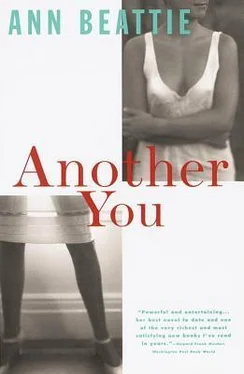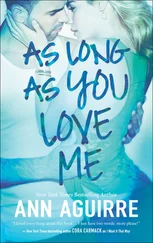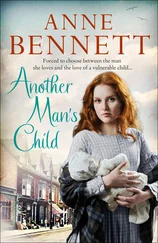Ann Beattie - Another You
Здесь есть возможность читать онлайн «Ann Beattie - Another You» весь текст электронной книги совершенно бесплатно (целиком полную версию без сокращений). В некоторых случаях можно слушать аудио, скачать через торрент в формате fb2 и присутствует краткое содержание. Год выпуска: 2014, Издательство: Vintage Books, Жанр: Современная проза, на английском языке. Описание произведения, (предисловие) а так же отзывы посетителей доступны на портале библиотеки ЛибКат.
- Название:Another You
- Автор:
- Издательство:Vintage Books
- Жанр:
- Год:2014
- ISBN:нет данных
- Рейтинг книги:5 / 5. Голосов: 1
-
Избранное:Добавить в избранное
- Отзывы:
-
Ваша оценка:
- 100
- 1
- 2
- 3
- 4
- 5
Another You: краткое содержание, описание и аннотация
Предлагаем к чтению аннотацию, описание, краткое содержание или предисловие (зависит от того, что написал сам автор книги «Another You»). Если вы не нашли необходимую информацию о книге — напишите в комментариях, мы постараемся отыскать её.
Another You — читать онлайн бесплатно полную книгу (весь текст) целиком
Ниже представлен текст книги, разбитый по страницам. Система сохранения места последней прочитанной страницы, позволяет с удобством читать онлайн бесплатно книгу «Another You», без необходимости каждый раз заново искать на чём Вы остановились. Поставьте закладку, и сможете в любой момент перейти на страницу, на которой закончили чтение.
Интервал:
Закладка:
He was trying to find a way to blame the victim, he realized. Why bother? If McCallum didn’t know to keep his hands off undergraduates, this was exactly what he deserved. But was it really possible that McCallum, striding along in his black sweater and his gray-and-white-striped jeans that were so out of fashion they could quite possibly be of-the-moment, hipper than hip — was it likely that he had tortured one of his students, then returned to campus to deconstruct coming-of-age novels, walking and talking the same way, offering passing waves to colleagues, his vampire fangs retracted into small, slightly buck teeth he self-consciously covered with his hand when he spoke? That was it: there was something about his embarrassment about his protruding teeth, there was some awkwardness in the way McCallum carried his body because of his shame about his teeth, that made him question whether the events in Revere were as unambiguous as Livan made them out to be.
Thinking this, he noticed, sadly, a cluster of dead elm trees as he pulled into the parking lot of a convenience store and tried to think what to do. There was an outdoor phone, over by the pyramid of stacked soft drink cartons — what did they do, disassemble the pyramid every night, so the Cokes wouldn’t freeze? — and he eyed it, wondering whether he should call Cheryl and tell her they needed to talk before he got to her apartment, or whether he should simply call home (if the house hadn’t burned, his house would be right where he’d left it) to ask Sonja’s advice, or even whether he should call McCallum to ask for his side of the story. Of the three possibilities, calling McCallum seemed the most upsetting, so he decided he would, indeed, call McCallum. He would at least give the man the benefit of the doubt so he could address the accusations.
A teenage girl came out of the store, her arms thrown around a boy’s arms, pinning them to his sides, giggling. She had on a cap with a tassel, and on her feet the same camouflage boots Sonja was so fond of, though purple leg warmers rose from the girl’s boots to just below her knees. Even in her padded jacket, he could see that the girl was scrawny — a word his father had used, which he realized no one used anymore — scrawny and full of enthusiasm, teasing the boy about something and laughing. They got in their car, a beat-up Ford of some indeterminate color that reminded him of the walls in a house he had toured recently, when it was first listed with Sonja’s agency. What had Sonja said they were called? Sponged and glazed. The half-rusted, sun-faded car looked like the sort of paint job rich people wanted on their walls now. He watched them climb into the car, and then, as the headlights went on, noticed a strange blur of movement inside the back window: cats, it was — kittens, five or six of them, their legs slipping out from under as the boy abruptly gassed the car, many of them thrown back against the window, or, Marshall guessed, spilling onto the backseat, one or two dark shapes remaining as tires squealed and the Ford lurched onto the road, bucking as if it were about to stall, then shooting into the far lane. What was the story behind that? Two teenagers with kittens from some stray cat they’d taken in. It was sad, but at the end of every school year, abandoned cats and dogs — even turtles and snakes — would prowl the campus looking for their owners, growing gradually thinner as they tried to find a new friend, many of the dogs and some of the cats following everyone and anyone, in desperation. Once, an obviously malnourished yellow lab had jumped in Marshall’s car and sat hopefully in the passenger’s seat. He had found a starved cat dead in front of a Coke machine outside the gym. But McCallum’s having found a box turtle, HIS HIGHNESS MR. TURTLE painted on its shell with red paint … wait: McCallum had been dismayed and angry to have found the turtle upside down in the center of the sidewalk — a football; he had taken it, at a distance, to be a football — did it stand to reason that a man who rescued a turtle would take a student to another city and tie her to a bed? Of course, Hitler had been a painter, a vegetarian. Too many people were bored with what they were doing, and also passionate about something else they did: the internist a lepidopterist, his nurse a blackjack player, the accountant in the waiting room a collector of Byzantine coins. Most of the time Marshall found such things wonderful, but in a way such situations also made him sad — his suspicion that so many other people were not pursuing those things they really loved, as if only the young had immunity from society’s questioning a person’s desire to be a doctor who catches butterflies and who enjoys discussions about ancient coins, with a few other interests thrown in, such as figure skating, raised-bed gardening, an attempt to read the complete writings of Henry James, plus an interest in the occult and a passion for rappelling. Which, in fact, was true of the doctor Marshall had seen for five or six years, who had finally left the area to study neonatal surgery, while attending whatever performance art was happening in Seattle, as the blackjack-playing nurse, who had become his wife, began to think seriously about adopting a second Rumanian baby. With this multifaceted man, he had once discussed a burning feeling when urinating. A peculiar stiffening of his knee. A rash behind his ears. Those odd yet invigorating office visits: a shot of cortisone for the knee, but how could Marshall, a professor, not have read The Golden Bowl? An ointment for the rash, but had Marshall thought about the possibility of learning to scuba dive instead of settling for snorkeling? He felt a kind of hero worship toward the doctor, while at the same time being in the man’s presence too long could exhaust him. They’d kept in touch, exchanging books and Christmas notes, and Marshall felt that if the man had stayed in New Hampshire, they would probably have become friends. In fact, for all his colleagues and in spite of Sonja’s love, he sometimes felt that he had no friends: they would be, like Sonja, more than friends, or, like McCallum— God, McCallum, you insane fucking fool —people who gave intermittent signs of being a friend, but were not.
He parked and went inside the store, where he poured himself a cup of coffee and paid with a dollar bill to get change for the phone. Sonja might be back at the house, and he could ask her advice, tell her about the visit he was about to make. He deposited the money, hunching his shoulders against the wind. The line was busy. As he redialled, the amusing thought crossed his mind that calling home to explain his whereabouts was not something Shelley or Keats would ever have worried about. Yeats. Could anyone imagine Yeats chatting on the phone? The beautiful closing line of Yeats’s “An Irish Airman Foresees His Death” passed quickly through his mind. Here he was, in a rather ridiculous situation, suddenly contemplating life and death, which could only mean that he was very anxious, he thought the stakes in his mission were high, or feared they might be. Sonja, of course, would think his involvement in this was a big mistake. Maybe not the involvement so much as the way he was handling things. Though how was he handling things? So far, by conjuring up lines of poetry written by Yeats, while loitering around a convenience store and wondering about the lives of people who got in their cars, by sipping coffee which would keep him awake later that night, by being on sensory overload.
He got McCallum’s number from information. The phone was answered by a woman, and in the long time it took McCallum to pick up, Marshall thought seriously about replacing the phone in its cradle, driving to McCallum’s, and asking him to take a ride with him, confronting him in person.
Читать дальшеИнтервал:
Закладка:
Похожие книги на «Another You»
Представляем Вашему вниманию похожие книги на «Another You» списком для выбора. Мы отобрали схожую по названию и смыслу литературу в надежде предоставить читателям больше вариантов отыскать новые, интересные, ещё непрочитанные произведения.
Обсуждение, отзывы о книге «Another You» и просто собственные мнения читателей. Оставьте ваши комментарии, напишите, что Вы думаете о произведении, его смысле или главных героях. Укажите что конкретно понравилось, а что нет, и почему Вы так считаете.












